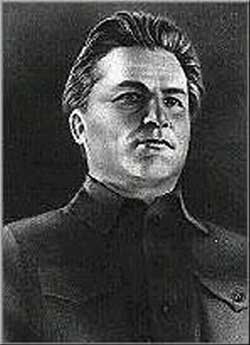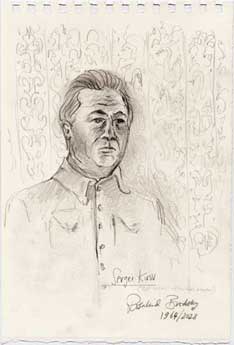OPERATION SWANLAKE
(2028
- 2029)
SERGEI
KOSTRIKOV
(aka KIROV)
 Sergei Kirov 1934 |
 Kirov Stamp USSR 1956 |
||||||
|
Sergei
Kostrikov (aka KIROV) born 27 March 1886
Though complicit in many of the crimes perpetrated during the Stalinist Era, Kirov was the lone rising star seemingly capable of standing up to Stalin. Sergei Kirov was murdered December 1, 1934. This event marked the beginning of the Great Terror. In 1935 the name Kirov was given to the Mariinsky Theatre, Leningrad, a series of Heavy Missile Cruisers, constructed at the Baltic Shipyard, Leningrad and various industrial works across the USSR. SERGEI KIROV BIOGRAPHY: The Kirov Murder The turning point of Soviet history occured when a young party functionary allegedly aimed and fired a round from his Nagan revolver into the back of the neck of one Sergei Kirov. Kirov was a rising star in the Communist Party of the 1930's. Although he was no capitalist, he surreptitiously opposed the extreme measures Stalin was forcing upon the Soviet peoples. Kirov's death would trigger show trials, purges and the ultimate demise of thousands and perhaps millions. Biography Sergei Kostrikov was born (27 March 1886) to a poor family in Urzhum, Russia, a small town nestled in the Ural mountains. His father, Miron Kostrikov left home while Sergei was still at a tender age. Times were hard in late 19th century Russia. His mother and sisters eaked out a hardscrabble existence and put considerable energy into providing for and educating young Sergei. His mother, (Ekaterina) died the subsequent year (1893). His care was then turned over to his Grandmother. In 1901 a group of local, wealthy benefactors provided the growing Kostrikov with a scholarship at an industrial school in Kazan. He earned a degree in engineering. It was in Tomsk, Siberia in 1904 and during the 1905 Russian Revolution that Sergei began to awaken to Marxist ideology. His idealism was spawned by the poverty endemic in a totalitarian state and the lure of an organization promising, however irrationally, to eradicate the vagaries of the human condition. He became active in the Russian Social Democratic Labor Party and was arrested several times in 1905 and 1906 for illegal agitation against the state. By 1909 he had moved to Vladikavkaz. Although he was not trained to be a journalist, he had the interest and aptitude to get on the staff of a liberal newspaper, TEREK. In 1911 he was arrested again and continued to bolster his revolutionary credentials through his work distributing leaflets and agitating workers at factories. By 1917 he was prepared to throw himself into the maelstrom of the Russian Revolution. The great war (1914-18) had absorbed all of Imperial Russia's economic and human capital - bankrupt, it slid further and further into revolutionary ferment. When Lenin arrived in 1917 the inevitable occured. The autocratic Czar was killed (as was his entire family) and a subsequent civil war wreaked havoc upon the countryside. By this time Sergei Kostrikov had changed his name to Kirov. He had selected it as a pen name. He had seen the name, "Kir", on a calendar of Saints names. It reminded him of a Persian warrior king. It was an appropriate name for the young man who was to become head of the Bolshevik military administration in Astrakhan. In this position, he ruthlessly crushed the White Russian forces who were fighting for a return of the czar. As a reward for his grim work in Astrakhan, he was appointed Russian Embassador to Georgia. While there he helped instigate the Soviet takeover of the Region. In the early 1920's he worked his way up the party machinery to become the Secretary of the Communist Party of Azerbaijan and was also elected a member of the Central Committee in Moscow. In the Soviet Union, party secretary was the true position of power since it was the secretary who controlled all communist party and government appointments. Stalin himself derived his power from the fact that he was the head secretary of the communist party. The Russian Revolution and the subsequent civil war did not change the essence of rule in Russia. The autocratic Czar was replaced by an autocratic secretariat of the communist party. However, the new regime, without the legitimacy of time or popularity, was compelled by repressive measures to maintain power. Kirov assisted in these measures, which included forced labor camps, and the destruction of a peasant class known as the Kulaks (of which it is estimated that 4-8,000,000) were killed) Though there is evidence that Kirov attempted to minimize the disruption and destruction, there is no doubt that by his actions ten's of thousands of individuals were liquidated. In 1926, after Stalin initiated a purge in Leningrad (the second largest city in Russia), Stalin replaced his rivals with a man on whom he felt he could depend. As the new head of the Leningrad Communist Party, Kirov was put in a position of prominence and power second only to Stalin himself. From 1926 to 1934, as Stalin's paranoia was becoming more noticeable and more destructive, Kirov became more and more the only evident rival to Stalin. Though he always towed the party line, he put softer touches on the repression and was becoming more and more popular with the people. At a Party conference in 1934 he spoke out against some new repressive measures being dictated by Stalin. He was loudly applauded by the party apparatus. Some even thought that he might be able to topple Stalin from his position as overall party leader. It was less than a year later that Kirov was murdered... An Act Of Murder The events surrounding the death of Sergei Kirov are now made dim by the passage of time. All of the major participants and witnesses are now dead. (Many were subsequently liquidated in Stalinist purges.) Yet there were several investigations subsequent to the event that shed light. The verifiable information from NKVD (KGB) investigations and the rootings of historians tells the following story: On 1 December 1934 Kirov arrived at his office in Leningrad (St. Petersburg). It was about 4:30 in the afternoon. He was preparing for a speech to be given later to party officials. He was met by four plainclothes NKVD guards. He was greeted also by his usual bodyguard, Borisov. Kirov's office was on the third floor of the Smolnyi. Kirov was accompanied by this group of guards up the stairs. The four NKVD guards left Kirov when he reached the third floor of the building because there was another guard post at the top of the stairs. However, his usual bodyguard, Borisov, remained with him. Borisov seems to have dallied quite far behind Kirov as they went down the hall. Kirov's office was around a corner to the left. As he walked by a lavatory, near the 3rd floor guard post, a man came out and then turned to face the wall. Kirov took no notice of the man and neither did Borisov who by this time was some distance behind. The man from the lavatory was one Nikolaev. He followed Kirov around the corner out of site of Borisov. Suddenly shots were heard... Shot from about three feet away in the back of the neck by a Nagan revolver, Kirov fell against a post and then slumped to the floor, face down. Kirov and his assailant were not alone at this moment. One S. A. Platych, an electrician, was standing on a ladder near the end of the corridor. He subsequently testified that he had seen Nikolaev direct the pistol now at his own head. The electrician then flung a screwdriver at Nikolaev, knocking the assailant to the floor and causing the revolver to discharge into a nearby cornice. (Platych in a separate deposition stated that he had not seen Nikolaev use the weapon at all. That he saw the man slump to the floor and the weapon was near him when he did so. Platych then picked up the revolver and threw it into the corner - Which statement is the truth no one is quite sure.) Borisov, the hapless bodyguard, heard the shots and ran around the corner to witness the remains of the gruesome scene. Others had been meeting in a conference room near where the murder took place. As Borisov achieved the corner these men poured into the corridor, Ivanchenko, Rosliakov, Ugarov, Kodatskii, Mikhail'chenko and Struppe. Rosliakov testified that he found Nikolaev slumped on the floor with the revolver in his hand. He took it out of the "assassin's" hand and gave it to Ugarov. The NKVD chief, Medved, was then called. Another witness to the murder scene was Stero Gorokova. She came out of her office upon hearing the shots and testified that she saw Mikhail'chenko leaning over the body of Nikolaev. She could not see what he was doing. There is considerable conflict in the testimony of witnesses of Kirov's demise. Some of this conflict can be attributed to perspective, confusion or the passage of time. Others give it a more insidious connotation... http://lcweb.loc.gov/exhibits/archives/repk.html Revelations from the Russian Archives REPRESSION AND TERROR: KIROV MURDER AND PURGES The murder of Sergei Kirov on December 1, 1934, set off a chain of events that culminated in the Great Terror of the 1930s. Kirov was a full member of the ruling Politburo, leader of the Leningrad party apparatus, and an influential member of the ruling elite. His concern for the welfare of the workers in Leningrad and his skill as an orator had earned him considerable popularity. Some party members had even approached him secretly with the proposal that he take over as general secretary. It is doubtful that Kirov represented an immediate threat to Stalin's predominance, but he did disagree with some of Stalin's policies, and Stalin had begun to doubt the loyalty of members of the Leningrad apparatus. In need of a pretext for launching a broad purge, Stalin evidently decided that murdering Kirov would be expedient. The murder was carried out by a young assassin named Leonid Nikolaev. Recent evidence has indicated that Stalin and the NKVD planned the crime. Stalin then used the murder as an excuse for introducing draconian laws against political crime and for conducting a witch-hunt for alleged conspirators against Kirov. Over the next four-and-a-half years, millions of innocent party members and others were arrested -- many of them for complicity in the vast plot that supposedly lay behind the killing of Kirov. From the Soviet point of view, his murder was probably the crime of the century because it paved the way for the Great Terror. Stalin never visited Leningrad again and directed one of his most vicious post-War purges against the city -- Russia's historic window to the West.
|
|||||||
© Institute of Militronics and Advanced Time Interventionality 2058
back
to OPERATION SWANLAKE textpage
Time Travel Research Projects
menu
